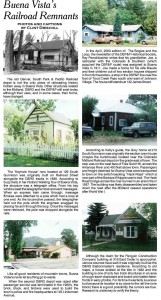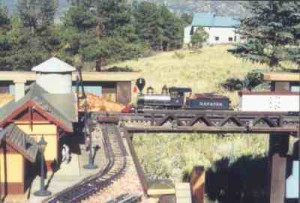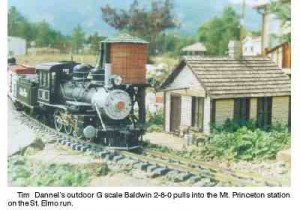Column by Hal Walter
Western life – January 2004 – Colorado Central Magazine
WHITHER THE RANCHER, that gnarled and stoic figure of Western lore? And what do the words “ranch” and “rancher” mean in the New West? Probably no word conjures up the Western mythology more than “ranch,” a notion visually propped by The Big Valley, Bonanza, and The High Chaparral, and more recently Lonesome Dove, Legends of the Fall, and All the Pretty Horses.
I read with interest a recent column by a self-described rancher-writer that was published in this magazine and all across the West from the Writer’s on the Range syndicate. The view of this contributor who splits her time between her “ranch in North Dakota and writing in Cheyenne,” was that if you don’t own hundreds of acres, and raise cattle and horses, or perhaps sheep and buffalo, then you cannot possibly be a “real” rancher.
There’s a certain provincialism in the notion that being born into a family that owns a lot of property, or being wealthy enough to buy into large acreage, automatically makes a person a rancher. By this measure the shampoo mogul from back east, who as a part-time resident with a staff raises buffalo on thousands of acres near here, would be considered a rancher. But the old guy who drove a beat-up 60s-vintage Ford to haul cows from his property in Florence to the state trust land he leased near here is not a rancher.
Our Writer on the Range says the term “ranchette” was coined by real-estate agents, but it’s also possible it was first uttered by ranchers who profited greatly by hiring real-estate developers to subdivide their ranches. By the way, in my dictionary no tract of land located east of I-25, my mind’s boundary between east and west, is considered a ranch regardless of size or type of animals raised on it. That’s just my own brand of provincialism, but then I’m the one doing the writing on this particular range.
Ranching is a Western term, and to many it is a state of mind that has little to do with the amount of property owned or the type of stock raised on it. While the terms “ranch” and “ranching” are generally used when discussing agriculture, primarily livestock, the term “homesteader” was applied to those who got 160-acre parcels from the government, known as “quarter-sections,” to pursue subsistence farming. Far from popular belief, I believe the term “ranch” originated among those who did not own enough land upon which to raise their stock. These ranchers leased grazing land or pasture for their stock, a practice also known as “ranching ’em out.”
There are several real ranchers, whom I count as friends. These are people who own large enough amounts of acreage and livestock that nobody questions whether they are real ranchers. But despite their holdings, most do other things for subsistence. They are meat-cutters, outfitters, travel guides, hay brokers, fence-builders, carpenters. Some have regular day jobs. One rancher I know owns hundreds of acres and many head of horses, cattle, sheep, and chickens, but actually makes his home on a 10-acre subdivision parcel. It seems the term “rancher” has evolved.
I own both a 35-acre parcel and several four-legged critters, but I’ve always struggled with the terms “rancher” and “ranchette.” Sure, I’d love to own more land but the truth is this is all I can afford. I have neighbors with signs adorning their 35-acre parcels proclaiming their property to be the “This or That” ranch. I also have a former neighbor who subdivided thousands of acres into ranchettes. Until recently he continued to run cows on the property, paying a lease fee to the new owners so that they might receive an agricultural tax assessment. There’s a word for this sort of business but I don’t think it’s ranching. However, according to the county tax code, all of these new homeowners on the former ranch are now “ranchers.”
By this same assessment, I am not a rancher like my neighbors who lease their property to the former rancher. This is because the grazing on my marginal and small acreage cannot support my own livestock for the duration of the year, and I must haul in hay to supplement. Therefore my land is taxed by the county at higher residential rates rather than at agricultural rates. Though I need a truck to haul feed and animals, I do not qualify for “farm plates.” However, on my other cracked and chapped hand, I am a rancher to the IRS, which has an interest in the low four figures I take in yearly on my very small donkey and mule operation. If I don’t show receipts for deductions such as hay, grain, mileage, equipment, depreciation on stock trailers and such, more of my paltry “ranch income” goes to taxes.
OFFICIALDOM ASIDE, the truth is we don’t really have a term in the West to describe this type of property, and the term “ranchette” just doesn’t work unless you’re trying to sell it. I’ve researched more appropriate nomenclature, believing that some less greedy culture may hold the key. I’ve seen the Spanish word “estancia” used to describe a ranch in the context of books, but the literal definition means “sojourn” which in English means “short stay.” This nuance may apply to most people who buy ranchettes in the mountains, but I’ve lived and raised livestock here for more than a decade, hardly a sojourn.
Another Spanish term, “granja,” means “ranch, estate, farm or property.” I like the word granja because it sends people scrambling for a Spanish dictionary and the definition leaves the matter of property size open for discussion. If my property is a “granja” I suppose that would make me a “granjer,” which rhymes with “ranger.” By the way, a “grange” in English is a farmers’ organization.
However, my Spanish-speaking friend Elodia who was raised in rural Mexico says that while the term “granja” could be used to describe my place, she would more fittingly call it a “ranchito” which means “little ranch.” What is a person who owns a ranchito? Well, that would be a “ranchero” or rancher. So in a culture in which what you do is valued more than the scale at which you do it, it appears a rancher is a rancher, regardless of the size of the holdings.
Recently the subject of what I’ve been “ranching” up here in the Wet Mountains besides a big pile of manure was brought into fairly tight focus. This came about in the form of a contractual offer for nearly a quarter-million dollars from a California buyer. Suddenly it was clear that what I had been raising here was not donkeys and mules, but rather net worth. And the most amazing thing was the only physical labor required was writing a monthly check to the mortgage company for about 12 years. I suddenly understood how real ranchers make real money.
Now I felt like a rancher for sure. My property was located well west of I-25. I own livestock. And I was poised to make a good deal of money by selling a “ranchette.” Moreover, as soon as I “sold out,” (another ranching term) I’d have to “ranch out” my critters by leasing some pasture because I really had no place to go and the buyer wanted us out in just a few short weeks.
WHEN FACED WITH such a life-changing proposition, you consider the full gamut. The temptation to take the money and emigrate to a third-world South American country and live out the rest of your life on the beach eating fish tacos and drinking beer comes to mind. Or you could move to town, get a small house . . . Yeah, right . . . Finally, you start shopping for another ranchito. But you quickly learn the profit made by selling this property is just enough to get you into even more debt on a new ranchito that doesn’t have the nice trees or grazing like this one does.
During all this mental stress it occurred to me that our buyer might be coming here for a sojourn, so she might be able to call this place an estancia. Then it struck me that I could not picture her here at all. At this writing it appears this latter intuition was correct. The buyer has let the deadline on our counter-offer, which involved a couple extra weeks to move, expire. So my inability to picture her here proved to be accurate, at least thus far. It could be years, or never, before another offer like this comes along. Or I may just take down the “For Sale” sign.
Meanwhile, all across the West, the mythology of ranches, ranchers and ranching continues to be called into question by those who want to buy or sell a piece of this lore, and by those who want to hold on to something that is being downsized more every day as more and more ranches become ranchettes.
Just what does it take to be a rancher in this New West? Is it property size, livestock, tax status, money, attitude? Does it really matter? Well, Hoss, in this West, where mythology has always been larger than life, the answer is, probably not.
Hal Walter writes from the Wet Mountains.



